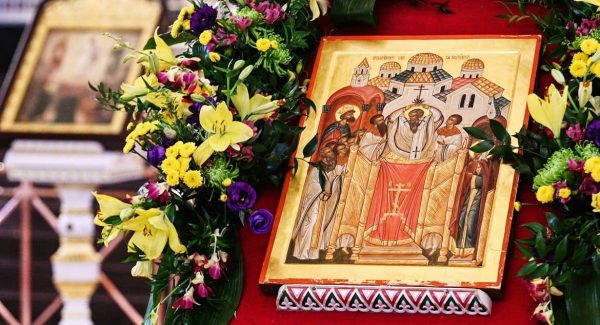If someone wants to be a good piano player, he or she must have access to a piano, practice regularly, and above all find an excellent piano teacher. If someone wants to be a cabinet maker, he or she must have the proper tools, learn to use them correctly and apprentice with a skillful cabinet maker. If someone wants to be a committed Christian, he or she ought to read the Gospels, study the life of Christ, and practice His teachings and spirit.
Today’s Gospel lesson (Mark 8:34-9:1) lays out the conditions and cost of being a true follower of Christ. We call it Christian discipleship. Today is the Sunday After the Feast of the Cross, and once again the Cross holds center stage in our worship services. In the Gospel lesson, re-phrased to apply equally to men and women, Christ declares: “If any would come after me, let them deny themselves and take up their cross and follow me. Whoever would save life, will lose it; and whoever loses life for my sake and the gospel’s, will save it. What does it profit to gain the whole world and forfeit life?”
“If any would come after me.” That is, if anyone desires to follow me, they can do so of their own free will. Jesus valued human dignity. He respected people’s freedom. Although He preached urgently about God’s kingdom, and called listeners to awaken, to sober up, to turn to God with their whole heart, and to practice righteousness, He called them to do so by their free choice. The commitment to follow Him was as good as the freedom behind it. Indeed, to be a follower of Christ takes serious thought. It involves a crucial decision and choice: do I keep following my ways in life or the path of Christ? Being a follower of Christ involves life-changing consequences. True discipleship is less about where one was born or what traditions were received from family—although these can be good things too—and more about one’s own present outlook, one’s own values and priorities, one’s own conscious choice to live as a committed Christian, this choice affirmed again and again throughout the journey of life.
“If any would come after me, let them deny themselves.” What is self-denial? To deny ordinarily means to renounce, reject, disavow. But to deny . . . one’s very self? Here is a stumbling block that has tripped not only devout Christians but also great thinkers. Many have viewed Christianity as unqualified denial, a negation of life, a religious enterprise that drains all the joy and song out of human existence. But what a whopping misunderstanding! What did Jesus really deny in His teachings? Did He deny marriage and the joys of marriage? Not at all. He blessed the marriage in Cana and provided gallons of fine wine for the guests. Did he deny the joy of children? He said, “let the children come to me,” receiving them and blessing them. Did He deny food and drink? Although He fasted for a time and a particular purpose, He nevertheless regularly enjoyed meals with people to such an extent that His enemies accused Him of being a glutton and a drinker! Did He deny friendship, honesty, loyalty, goodness, integrity, productive work, fair play and equal dignity for all people? No, He denied none of these things. Instead He talked about God’s kingdom, present and future, in the image of a banquet full of celebration and joy.
What did He then deny? He denied self-centeredness, the ingrained habit of each of us putting our own self first, apart from the will of God and the benefit of others. He denied self-pride, egoism, selfishness, arrogance, dishonesty and all moral wickedness, being the stuff of sin and evil. He said: “From within, out of the heart, come evil thoughts, theft, murder, adultery, coveting, wickedness, deceit, envy and slander.” We should add also prejudice, injustice, exploitation, conflict, violence and war. These things He did most assuredly deny as contrary to human nature and destructive to human relationships. These things, which dehumanize and damage all of us, make up what is the real and tragic negation of life. Yes, there is a denial, but a purposeful denial in order to make a resounding affirmation. It is the denial of the fallen self, the old Adam in us in order to affirm our true self in Christ, created in the image and likeness of God, and recreated and renewed by our Lord and Savior.
“If anyone would come after me, let them deny themselves, and take up their cross and follow me.” Jesus connects self-denial with taking up the Cross. The Cross in hymns and prayers is often a symbol of victory, the triumph over the powers of sin and death. But here the Cross signifies voluntary self-sacrifice and suffering, even death if required, following the path of Christ. Simply put, carrying the Cross means standing up for and living by what is right in the eyes of God no matter what. At Gethsemane, Jesus, full of anguish, prayed: “Abba, Father, remove this cup from me; yet not what I will, but what You will.” He went on with faith and courage to face arrest, beatings, humiliation, judgment, and was even forced to carry His own Cross to the hill of Golgotha, and be crucified between two criminals. And all this as expression of immense love and forgiveness for humanity, a sacrifice of love that we can never fully grasp until we meet Jesus face to face in His kingdom. “In this is love, not that we loved God but that God loved us first, and sent his Son to be the expiation of our sins.” This is what we celebrate in September observing the three sequential feasts of the Cross of Christ.
“Whoever would save life will lose it; and whoever loses life for my sake and the Gospel’s will save it.” We live and die only once. For each of us, life is not a rehearsal; it is the real thing and it is precious. Jesus said that there is nothing we could possibly exchange for the value of each life. To gain the whole world and to forfeit life is a disaster. But we try to gain life, to win it, by self-assertion, winning battles and acquiring things for comfort and security. In the process, paradoxically, we “lose” life. We follow the standards of the world, seeking advantage, prosperity, prestige, power, pleasure, and arbitrary freedom apart from God’s will and good will for others. Stubborn pride and arrogant self-opinion pit politicians against politicians, citizens against citizens, neighbors against neighbors, spouses against spouses, parents against children, or children against parents, and in the end we all lose because we cannot deny ourselves properly. The proud and the stubborn, the saints and sages teach, suffer from many devils. We may have our way, win many of our battles, even with those intimately related to us, but then we find we have gained nothing at all but estrangement, division and sometimes even death among us.
The way of Christ, the way of the Cross, is very different. It is the way of purposeful self-denial for the affirmation of true life for all of us as God’s family. Jesus has taught us to be humble, truthful, forgiving, compassionate, meek, peacemakers, pure in heart, and so to be the salt of the earth and the light of the world. When He was slandered, He spoke the truth but did not wish evil on His tormentors. When He was dying on the Cross, He whispered a prayer of forgiveness for His crucifiers. Jesus taught love of enemies, the hated Romans, as a way of breaking the cycle of violence. By worldly standards, the way of the Cross is foolishness, a scandal to pride and self-assertion, a way of choosing to become losers. By God’s standards, the way of the Cross is God’s power of love, a deep and selfless love that is willing to sacrifice not the self but selfishness, as God’s way that leads to true life, a way of being winners in Christ.
We carry crosses of various sizes and weights pertaining to health, job, financial difficulties and inter-personal interactions. When we are faithful and prayerful in sickness or some other trial, God will strengthen us to face it with courage, and we gain life by clinging to God. When we are patient with our spouse, willing to choose the right moment and the right words to work out reconciliation, and if we are willing to practice God’s love and forgiveness, we gain life by saving our marriages. When we are loving and wise with our children, applying firm counsel with gentleness, rather than lapsing into anger and verbal abuse, we gain life by saving our family. When patient at the office, exercising good will toward others and still accomplishing our work cheerfully, we gain life by doing our part in enhancing the company. When we are thoughtful citizens, mindful of the complexities and the evil in the world, and still fulfill our civic duties in good faith, we gain life by contributing our tiny share in strengthening our country and perhaps the world. We can do all these things by following the way of Christ, honoring His Cross, His way of overcoming evil with good. The symbol of the Cross has two main bars, one horizontal and one vertical, intersecting and making the mathematical sign of plus. The Cross of Christ is always a plus, God’s way of grace and love for the life of the world.
To Christ, the One “who gave Himself for our sins to deliver us from the present evil age” (Gal 1:4), be honor and glory forever. Amen.

















